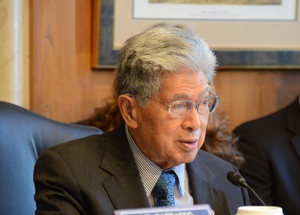Washington D.C. –
U.S. Senator Daniel K. Akaka (D-Hawaii), Chairman of the Senate Committee on Indian Affairs, held an oversight hearing today to examine how federal agencies play a role in deficit reduction and job creation in Indian Country.
“Tribes need strong local economies not just to provide jobs and services to their own members, but also to help support families in surrounding communities. Tribes are often in a unique position to drive local economic growth and job creation as the largest local employer and purchaser of goods and services. But they need the right tools to do so effectively,” said Senator Akaka.
 Federal agencies have the ability to provide access to capital through secured loans and financing tools, such as the Department of the Interior’s Indian Guaranteed Loan Program and the Rural Energy for America grant program, but witnesses voiced concern over the challenges that still remain in how these funds are accessed and leveraged in tribal enterprises.
Federal agencies have the ability to provide access to capital through secured loans and financing tools, such as the Department of the Interior’s Indian Guaranteed Loan Program and the Rural Energy for America grant program, but witnesses voiced concern over the challenges that still remain in how these funds are accessed and leveraged in tribal enterprises.
Witnesses also stated that the Supreme Court’s Carcieri v. Salazar decision paralyzes economic development and creates lending freezes because banks and other financial institutions are unwilling to support tribal businesses when it is uncertain how tribal land will be affected.
In the Carcieri v. Salazar decision, the Supreme Court reversed 75 years of policy and practice. The Indian Reorganization Act (IRA) of 1934 authorized the secretary of the Interior to take lands into trust for federally recognized tribes. The court threw all tribes into a tailspin of uncertainty by ruling that the secretary did not have the authority to take land into trust for tribes that were not considered “under federal jurisdiction” when the IRA was enacted. The court did not define “under federal jurisdiction,” and in 1934 no official list of federally recognized tribes existed.
“The single most effective measure that this Congress can take to spur job creation and economic development is to end the uncertainty caused by the controversial Carcieri decision,” said Cedric Cromwell, Chairman of the Mashpee Wampanoag Tribe. “Once the uncertainty stemming from Carcieri is resolved, tribes will be able to more speedily restore a land base, access funding, reconstruct portions of our homeland, and create jobs and opportunities for us and for the communities among whom we now live.”
“The uncertainty around Indian lands is a barrier to economic development that could be removed in an instant. The Carcieri fix is a no-cost way to build tribal economies. That certainty would have economic ripple effects that would be felt well beyond our reservations and it wouldn’t cost a cent,” said Jefferson Keel, President of the National Congress of the American Indians.
“The Carcieri decision, along with layers of complex regulations and administrative procedures, especially in energy development, has led to underdevelopment of energy and economic development projects on Indian lands,” said Akaka.
Witnesses also discussed the role that federal agencies play in supporting tribal infrastructure development and expressed the need to bridge the digital divide by making broadband more accessible to Native communities.
“Native Communities suffer from a lack of sufficient infrastructure, especially broadband, which makes it difficult to provide housing, healthcare and education for a qualified workforce,” said Akaka.
“Less than 10 percent of residents on Tribal lands have access to broadband,” said Geoffrey C. Blackwell, Chief of the Federal Communications Commission’s Office of Native Affairs and Policy. “Broadband, the most critical 21st century infrastructure, is the predicate to thriving communities and an environment of economic opportunity.”
“The United Nations recently identified access to the internet as a basic human right. However, tribal communities continue to experience low access,” said Keel.
“In a deficit reduction-focused environment that is forcing Congress to consider its priorities even more closely, it is important to understand that tribes are disproportionately reliant on federal financing and infrastructure development. It is imperative that federal agencies find better ways to partner with tribes and the private sector to maximize federal dollars so that they can reduce barriers, grow rural tribal economies, and create jobs,” closed Akaka.
More information and an archived webcast is available on the committee’s website: LINK
Contact: Emily Deimel
Contact Phone: (202) 224-2251
Contact E-mail: emily_deimel@indian.senate.gov
